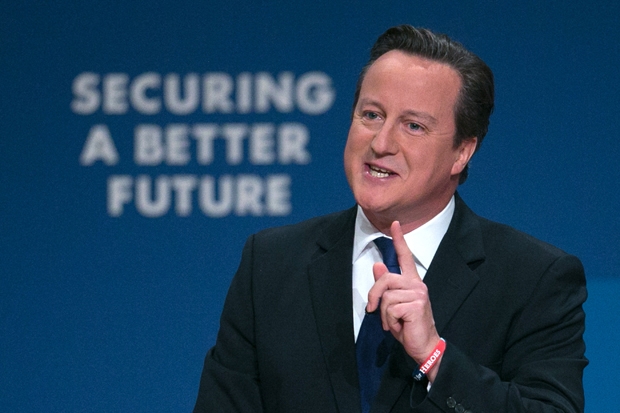[audioplayer src=”http://traffic.libsyn.com/spectator/TheViewFrom22_23_Oct_2014_v4.mp3″ title=”James Forsyth, Mats Persson and Matthew Elliott discuss Europe” startat=60]
Listen
[/audioplayer]Imagine if David Cameron actually meant it. Imagine if he really did follow through with his implied threat to campaign for Brexit in the absence of better terms from Brussels. You can picture the televised address. An oak-panelled background with a large union flag hanging sedately in the corner, the PM with that furrowed house-captain expression he sometimes does. The script pretty much writes itself.
‘All of you know how hard I tried to secure a new deal. I was often criticised for being too conciliatory, but it was my duty to do whatever was in my power to reform the EU. I have to tell you today that the Brussels institutions are not interested in — are perhaps not capable of — the reforms that I believe the British people want. I am therefore seeking a different relationship with the EU, one based on free trade rather than political union.
‘We remain committed to the free circulation of goods, services and capital in Europe. Like Switzerland, we shall continue to participate fully in the European market. But we shall now be free to sign bilateral trade accords with faster-growing nations on more distant continents. We shall control our domestic affairs: taxation, employment law, social policy, defence, farming, fishing, immigration. And our statutes will, for the first time since 1972, have primacy on our territory.
‘It will be for the British people to decide whether to remain in the EU or whether to pursue this global vision. I intend, if re-elected in May, to campaign in a referendum for independence, to negotiate an amicable separation from the EU, and to recover the maritime and mercantile vocation that our fathers took for granted.’
A landslide election victory would surely follow. If even so moderate a politician as David Cameron felt that EU membership could no longer be tolerated, the country would rally to his cause.
Almost no one expects it to happen, though. Voters know that words are cheap (although whoever made that observation had evidently not sat through a debate in the European Parliament). They no longer take things on trust from any politician, and my party has a particular problem with the EU. Since the mid-1990s, our rhetoric has been increasingly Eurosceptic, but we have gone along with a more and more centralised EU.
People aren’t impressed by the PM being rude about José Manuel Barroso when, at the same time, they see him ordering his MPs to vote to opt back into the illiberal European arrest warrant. They aren’t impressed by his loud disapproval of Jean-Claude Juncker when they see him telling his MEPs to vote for Juncker and his Commission.
One of the Tory leader’s virtues — an unusual one in politics — is that when he has to change his position, he does so without a hint of sulkiness. The Commons vote on bombing Syria was an example; the vetoing of the Fiscal Union Treaty in 2011 another. The phrase ‘making a virtue of necessity’ might have been written for David Cameron.
Which is why it is theoretically conceivable that, if he got nothing from the EU, he might pivot, sweep the country and lead Britain to a prosperous global future.
But I have to be realistic: he has set the renegotiation bar so low as to be able to claim victory in almost any circumstances. If he really has a contingency plan that involves seeking a free-trade-only deal with the EU, he’s the best poker player in the world.
Once you’re set on EU membership, you become good at rationalising every setback — even something as brutal as 26 of the other 27 members backing Juncker. Four months later, you’re backing him yourself.
The choice at the election, if you’re a Eurosceptic, is clear enough. You can have a pro-EU leader who will nonetheless give you an in/out referendum (David Cameron), an anti-EU leader who can’t deliver one (Nigel Farage) or a pro-EU leader who doesn’t even pretend to want one (Ed Miliband). I trust the electorate, and am more bullish than most about winning a referendum on withdrawal even against the three party leaders.
Still, what an opportunity looks like sliding past. The latest poll shows the Conservatives and Ukip taking 50 per cent of the vote between them, while Ed Miliband becomes prime minister with 34 per cent. It’s enough to make you weep.
Daniel Hannan is a Conservative MEP.






Comments